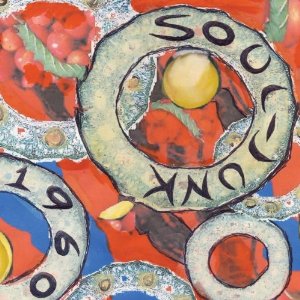But don’t sweat the arithmetique. Although numbers have their significant role, the decidedly family affair that is 1960 ultimately concerns letters, which lead to words, which leads to The Word — which, as it is written, came before the rest anyway…
This indeed means actual Biblical text. Specifically, from The Book of Psalms (New King James Version). In the grand tradition of classical composers both older — Vivaldi, Bach, Mozart — and more recent — Charles Ives, Igor Stravinsky, Leonard Bernstein — as well as a handful of discerning popular artists from U2 to the dubbed-out Prince Far I, Soul-Junk has returned to the rich inspiration of the Bible’s “Songs of Praise.”
Soul-Junk’s 1959 album (2007) featured group mainstay Glen Galaxy singing the first 23 of the book’s 150 psalms, a solo outing except for a touch of vox from his four-year-old daughter Mila. Like past S-J fare, Galaxy voiced over a diverse collection of original instrumentation, tuneful delvings in off-kilter indie rock, lo-fi folk, and open-ended hip hop, all informed by a genre-transcending liberty. (From the very free-est of jazz to the most radical turntablism, Galaxy is a knowledgeable music fan.)
1960 pushes everything further while narrowing the scriptural focus: Psalm 119, the longest of all, 176 lines, eight for each of its 22 sections — which are designated in order by, respectively, each of the 22 letters of the Hebrew alphabet. (Further, it is an acrostic poem in the original Hebrew, with each successive letter of the alphabet leading off that respective namesake stanza; tradition holds that King David, largely credited as The Book of Psalms principal composer, used it to teach his son Solomon his ABC’s, as it were, along with deeper instruction in joyfully observant worship.)
The lyrics for each of 1960’s 22 tracks are drawn verbatim from its respective part of Psalm 119. How Galaxy ardently phrases the verbiage in distinct melodic songcraft — lingering on a line for its transitional capability, emphasizing another for its inherent catchy power-chorus effect — this is where the creativity poured into each song begins to elevate all. (Even Galaxy’s unique interpretive semantics get in the mix via secondary, oft-descriptive and occasionally enigmatic track titles: “screaming lobster” — sounds like a hit! “scottish yak” — perhaps striking an evocative chord in some, remembering “YakBoy=Nurturer” off Of Thick Tum, the John Peel-praised 1992 debut album from the influential indie “guitar-rock” band Galaxy fronted, Trumans Water … perhaps.)
Although repeatedly, massively, fervently rocking out more often than any Soul-Junk record in years, 1960’s crystalline/inventively fuzzified electric guitars and pounding drums (courtesy of recurrent S-J stalwart Brian Cantrell, a Galaxy associate since 1980s high school days in SD) tell only part of the sound-story. Having enlisted over a dozen S-J members through the years, vocalist-guitarist Galaxy is joined by eight others here for a suitably large-scale Soul-Junk ensemble.
Completing the core power-trio, there is thunderous bass from the moonlighting Emil Nikolaisen, guitar-playing front man for Norway’s Serena Maneesh. There is spirited keyboard from Portland, OR’s soulful Todd Fadel. There is ample cello from Jie Jin, a prized classical player active throughout the Delaware Valley and beyond. There is marimba and additional guitar from Joshua Stamper, a Danielson member whose overall charting/arranging skills were tellingly engaged.
And there are those voices — family voices. Danielson Famile ringleader Daniel Smith (whose sister is married to Galaxy’s brother) is joined by his wife Elin Smith and father Lenny Smith in singing out/harmonizing along. And contributing some colorful album artwork, there is Glen’s son Jude, who joins his dad on stage these days as an estimable teen trapsman.
The Word, sound, vision — family: Soul-Junk’s 1960.” David R. Stampone
Track List 1. [aleph] let the dead bury their dead, you go preach the kingdom of God 2. [beth] javanese 3. [gimel] the teeth 4. [daleth] kitchen qualify 5. [he] rudolph 6. [waw] screaming lobster 7. [zayin] threewise 8. [heth] saturn ring hula 9. [teth] hangtime 10. [yod] sawp jaws 11. [kaph] ahasuerus jig 12. [lamed] forever o Lord your word is settled in heaven 13. [mem] sweeter than honey 14. [nun] your testimonies 15. [samek] zizzer 16. [ayin] jauncy burza 17. [pe] tack & yearn 18. [tsadde] born 19. [qoph] scottish yak 20. [resh] solar mist 21. [shin] big bear cassiopeia 22. [tau] persian earball




